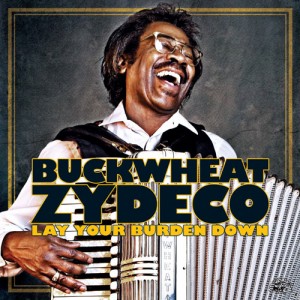Today is so beautiful that I rode my bike to work from Uptown. Here’s the internal monologue as I rode with my iPod on shuffle.
Y.F.O.C./Slippy Floor – the Fall: From the Fall’s Your Future – Our Clutter from earlier this year. Why don’t I listen to the Fall more? Why don’t bands stay as eccentric and hard as the Fall? Is Mark E. Smith that hard to deal with? I love a band that figures out one cool riff and plays the hell out of it, letting dynamics serve as the hook instead of writing unnecessary parts. Love the Rickenbacher bass; haven’t heard that trebly bass sound since the early days of Rush.
 Let Your Yeah be Yeah – Buckwheat Zydeco: From last year’s Lay Your Burden Down – No offense to Buck, BeauSoleil and Terrance Simien, but it’s pretty clear that Grammy voters are voting name recognition on Best Cajun/Zydeco album if they thought Lay Your Burden Down was zydeco. Or, zydeco’s closer to ska and R&B than anybody realized. The album’s great, but it’s zydeco in last name only. I don’t know if I can safely attribute the decision to producer Steve Berlin, but whoever selected the songs to cover did a great job – solid tracks that aren’t so well-known that you can’t hear Buck without hearing the original in the back of your mind; still, he takes the Toots and the Maytals track and makes it his with a spirited vocal over a spry rhythm section.
Let Your Yeah be Yeah – Buckwheat Zydeco: From last year’s Lay Your Burden Down – No offense to Buck, BeauSoleil and Terrance Simien, but it’s pretty clear that Grammy voters are voting name recognition on Best Cajun/Zydeco album if they thought Lay Your Burden Down was zydeco. Or, zydeco’s closer to ska and R&B than anybody realized. The album’s great, but it’s zydeco in last name only. I don’t know if I can safely attribute the decision to producer Steve Berlin, but whoever selected the songs to cover did a great job – solid tracks that aren’t so well-known that you can’t hear Buck without hearing the original in the back of your mind; still, he takes the Toots and the Maytals track and makes it his with a spirited vocal over a spry rhythm section.
Love Letter to Japan – the Bird and the Bee: From Ray Guns are not Just the Future – This is pop so pure that it’s hard to imagine there’s an audience for it these days. I thought this electronic pop duo was my private discovery until I heard this song while lounging poolside at a Las Vegas hotel. Their album of Hall and Oates covers from earlier this year identifies a crucial influence while draining off much of the marketplace-at-the-moment production and arrangement nonsense that took much of the fun out of these songs the first time around. Inara George wisely makes the songs small and private, in contrast to Daryl Hall’s tendency to sing to an ill-defined middle ground. The original title was Guiltless Pleasures, Vol. 1, but by release time, it had been changed to Interpreting the Masters, Vol. 1 – I suppose Hall and Oates weren’t that into being thought of as music that had to be rescued from Guilty Pleasuredom.
Silva & Grimes – Holy Fuck: From this year’s Latin – I’m a little surprised to have so many songs from this year show up in a shuffle. Since I listen to new music so much, I reserve my iPod for purely recreational listening. This track speaks to the power of the motorik beat pioneered by Neu! The unaccented, unsyncopated 4/4 time that’s rushing slightly pushes this instrumental that has little else to speak of except atmospheric keyboard washes and a little melody that’s almost completely obscured by the ambient sounds of the morning – and the track holds up beautifully for its four minutes anyway.
Recently, I received the Neu! box – the three albums that the influential Krautrock band released while together, along with a disc of early live tracks and Neu! 4, an album that was first released in 1995 after sitting in the can for a decade, the product of the tensions between members Michael Rother and Klaus Dinger. That Dinger-directed release didn’t seem of a piece with the rest of the Neu! catalogue, which is defined by sleek, efficient tracks that captured a kind of modernity – not necessarily mechanical, but the precise product of people living in a mechanical world. I’ve been trying to find a contrarian, positive take on the Rother-guided release of Neu! 4 included here, but nothing’s coming. It’s livelier than Dinger’s version, but while the first three Neu! albums sound timeless, Neu! 4 is very much a product of mid-’80s synth technology, and only “Drive (Grundfunken),” “Crazy” and the tape-manipulated “Elanoizan” really hold up. If you want a rationale for paying attention to the album, it is curious how it cycles through a handful of melodies, making slight changes and revoicing them to create something semi-new. A rhythm-oriented band meditating on melody, perhaps? As for the live tracks, they’re largely improvised jam tracks before Rother and Dinger had figured out precisely what Neu! was, so they’re only interesting as history.
The first three Neu! albums belong in every collection; of the box-only material, nothing’s necessary. I’m really glad to have the booklet, though. It’s not an attempt to tell the band’s story in 40 or so pages; it’s more of a scrapbook that provides a framework for the band and hints at its life without trying to pin it down in a few thousand words.
Something from the Katamari Damacy videogame soundtrack – The sort of beautiful juxtaposition iPod shuffle is made for. After music that could go on forever, music made to go on forever. This track from the Japanese videogame is a self-contained musical thought, but it’s one that feeds from the ending back to the beginning with no glitch or disjunction. It does go on forever on the game – or at least a long as it takes you to finish a level.
Appropriately for videogame music, I got to the end of my ride before the song ended. Appropriately for the business world, a post I started working on first thing in the morning is now being finished just over an hour before time to head home.




